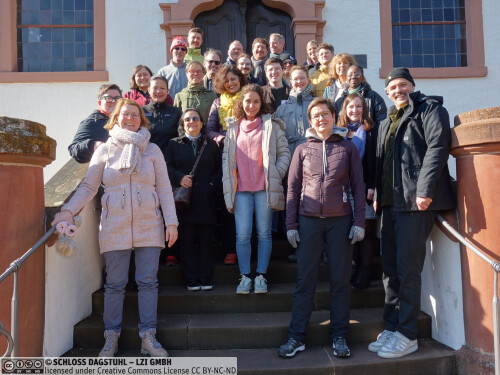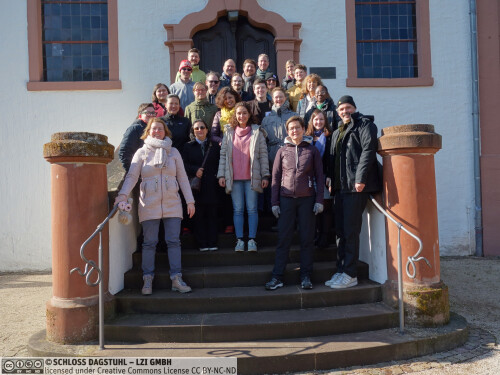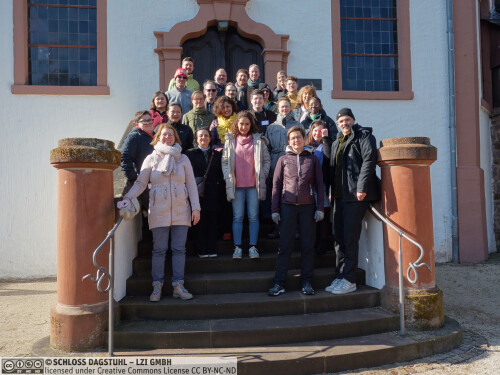Dagstuhl-Perspektiven-Workshop 23092
A Human-Computer Interaction Perspective to Drive Change towards Sustainable Future
( 26. Feb – 03. Mar, 2023 )
Permalink
Organisatoren
- Nic Bidwell (IUM - Windhoek, NA)
- Susanne Boll (Universität Oldenburg, DE)
- Marc Hassenzahl (Universität Siegen, DE)
- Kaisa Väänänen (University of Tampere, FI)
Kontakt
- Marsha Kleinbauer (für wissenschaftliche Fragen)
- Simone Schilke (für administrative Fragen)
Programm
Background and motivation
Sustainability from an ecological, social and economic perspective requires more attention than ever. To address and to implement the United Nation's set of sustainability goals is of utmost importance to all scientific communities, including information technology researchers. As a multidisciplinary field located within information technology, Human-computer interaction (HCI) constantly transfers knowledge and skills between the technically-oriented computer science, and psychology, social sciences, design, as well as other disciplines related to sustainability, such as environmental sciences. HCI's focus embeds technology into personal and societal practices and, thus, greatly influences the way technology is used in everyday life. At the same time, each new technology impacts the way we live. It shapes people's behavior and experiences. Through this mutual relationship, technological innovations have a great power to transform the world to be more ecological, resource-efficient, and inclusive. Not only can technologies be more resource-friendly, but also they can offer more ecological and social ways of interacting with the world. As a field, HCI is positioned to conceptualize, design and evaluate digital tools, able to suggest and to support the transformation of current into more sustainable lifestyles. Yet, while in principle HCI has all a field needs to contribute to a more sustainable future, it only hesitantly takes on the challenge of establishing sustainability at the heart of designing interactive information systems.
While sustainability is a global goal and needs many stakeholders from countries, organizations, and companies to make the transformation into sustainable societies happen, there is a large potential of individuals to make behavioral changes and contribute to sustainability as an individual and a collective. Digital interactive technology can play a major role in informing, supporting, reflecting, and acting in their everyday life and their individual societal and cultural context. However, this is not a single behavior change challenge in which we just have to offer a mobile app nudging us and that's it. Making such changes, taking different decisions comes with a large number of tensions such as who decides what the better lifestyle would be, and who could afford that change in their individual context.
A wider view on sustainability - the UN sustainability goals
Transformation requires goals. A good starting point for central requirements of sustainability are the UN sustainability goals. The 2030 Agenda for Sustainable Development, [1], adopted by all United Nations Member States in 2015, provides a shared blueprint for peace and prosperity for people and the planet, now and in the future. This agenda "is a plan of action for people, planet, and prosperity" and forms "universal goals and targets which involve the entire world, developed and developing countries alike." At its heart are the 17 Sustainable Development Goals (SDGs), which shall provide direction to transform the world via actionable objectives, from ending poverty to ensuring access to clean water and clean energy, to education and decent work for all. The goals assume that ending poverty and other deprivations must go hand-in-hand with strategies that improve health and education, reduce inequality, and spur economic growth - all while tackling climate change and working to preserve our oceans and forests.
Digitalization will play an important, even transformative, role in meeting the SDGs, and so can the field of HCI. An open challenge though is to translate these goals into actionable HCI evaluation and design practice, academic and professional, alike.
Participants and workshop approach
This workshop brought together scientists related to HCI and sustainability for this Dagstuhl Perspectives Workshop. We built on the United Nations' Sustainable Development Goals (SDGs) to identify central opportunities for HCI to advance sustainability in research, education, and everyday information systems. Through a series of interactive discussions, we explored the tensions around a more sustainable map of research topics and approaches suitable for advancing sustainability through HCI research. As the main outcome, the workshop will formulate a manifesto and roadmap for Human-Computer Interaction contributing to our common sustainable future. The core questions of the Perspectives Workshop were
- When and where is sustainability negotiable? We can observe that humans, and particularly the most disadvantaged, hardly have a chance of a liveable future. What does this mean for designing interactive systems that support sustainable behavior? Is sustainable behavior actually negotiable or a must for all?
- How do we address conflicts between people's individual goals, business goals, and global sustainability goals?
- What can HCI offer for those who cannot afford a more sustainable lifestyle? Lifestyle HCI sustainabiliteers who can feel better versus an inclusive approach? How do we model the contextual factors of individuals who make / do not make sustainable decisions?
- Can interactive technology help people who want to change to make changes in their lifestyle towards a more sustainable behavior? We contrasted technology that tells people what to do with technology in which persons are involved in the steps of behavior change.
- Can technology outbalance injustice in the situations in which sustainability challenges are caused by a few?
- How can technology help people compensate differently, adequately, and fairly?
Results
The 26 participants from all over the world were bringing in different perspectives to the workshop not only from their scientific and methodological background but also their lens of sustainability challenges in and from different areas of the world. Before the workshop, we collected a reading list of own and related work to set the stage for the discussions. For the workshop we invited three talks (online and in-person) that were setting the stage for the role of HCI for a sustainable future, the tensions of making sustainable and unsustainable individual decisions, and if we can or want to live with much less than today and still be happy. Based on the framework of the United Nations Sustainability Goals we discussed the tensions and opportunities for HCI contributing to sustainability for individual SDGs. We used speculative explorations of positive sustainable futures both from a technology perspective as well as from a research and practice perspective.
As a major result from the workshop:
- We selected and discussed SDGs in which HCI can make a contribution to a sustainable future and identified potential and open challenges which we will present in Section 5 of the full report.
- We used speculation as a form of analysis of possible futures and developed three design fictions in group works in Section 6 of the full report.
- We identified core areas where HCI can make a contribution to a sustainable future which will be elaborated and published in a manifesto.
References
- Department of Economic United Nations and Social Affairs Sustainable Development. Transforming our world: the 2030 agenda for sustainable development, 2015.
 Susanne Boll, Kaisa Väänänen, Nic Bidwell, , and Marc Hassenzahl,
Susanne Boll, Kaisa Väänänen, Nic Bidwell, , and Marc Hassenzahl,
Sustainability from an ecological, social and economic perspective requires more attention than ever. To address and to implement the United Nation’s set of sustainability goals is of utmost importance to all scientific communities, including information technology researchers. As a multidisciplinary field located within information technology, Human-computer interaction (HCI) constantly transfers knowledge and skills between the technically-oriented computer science, and psychology, social sciences, design, as well as other disciplines related to sustainability, such as environmental sciences. HCI’s focus embeds technology into personal and societal practices and, thus, greatly influences the way technology is used in everyday life. At the same time, each new technology impacts the way we live. It shapes people’s behavior and experiences. Through this mutual relationship, technological innovations have a great power to transform the world to be more ecological, resource-efficient, and inclusive. Not only can technologies be more resource-friendly, they can offer more ecological and social ways of interacting with the world. As a field, HCI is positioned to conceptualize, design, and evaluate digital tools, able to suggest and to support the transformation of current into more sustainable lifestyles. Yet, while in principle HCI has all a field needs to contribute to a more sustainable future, it only hesitantly takes on the challenge of establishing sustainability at the heart of designing interactive information systems.
While sustainability is a global goal and needs many stakeholders from countries, organizations, and companies to make the transformation into sustainable societies happen, there is a large potential of individuals to make behavioral changes and contribute to sustainability as an individual and a collective. Digital interactive technology can play a major role in informing, supporting, reflecting, and acting in everyday life and in individual societal and cultural context. However, this is not a single behavior change challenge in which we just have to offer a mobile app nudging us and that's it. Making such changes and decisions comes with various tensions such as who gets to decide which lifestyle is better? who can afford that change in their individual context?
In this workshop we aim to discuss the following questions related to tensions between the different perspectives:
- When and where is sustainability negotiable? We can observe that humans, and particularly the most disadvantaged, hardly have a chance of a livable future. What does this mean for designing interactive systems that support sustainable behavior? Is sustainable behavior actually negotiable or a must for all?
- How do we address conflicts between people’s individual goals, business goals, and global sustainability goals?
- What can HCI offer for those who cannot afford a more sustainable lifestyle? Lifestyle HCI sustainabiliteers who can feel better versus an inclusive approach? How do we model the contextual factors of individuals who make / do not make sustainable decisions?
- Can interactive technology help people who want to change to make changes in their lifestyle towards a more sustainable behavior? We will contrast technology that tells people what to do with technology in which persons are involved in the steps of behavior change.
- Can technology outbalance injustice in the situations in which sustainability challenges are caused by a few?
- How can technology help people compensate differently, adequately, and fairly?
In this Dagstuhl Perspectives Workshop we will map the contribution that HCI can make in light of the SDGs and what role HCI must play in informing and changing the behavior of individuals and collectives. We will focus on the goals: Health and Wellbeing (SDG3), Affordable and Clean Energy (SDG7), and Responsible Consumption and Production (SDG12); and what these mean for structuring our efforts for supporting sustainability with HCI. We aim to bring different perspectives from the field of HCI for sustainability together, this involves international researchers who already work in the areas addressed by different SDGs. Researchers who have already made a scientific contribution in the field of HCI but are also deeply rooted in the context and background of the SDGs will be able to bridge and translate the challenges of the SDGs into the foundations, methods, and application of human centered design and interactive technologies. A main outcome of the workshop is to formulate a manifesto and roadmap for HCI contributing to our common sustainable future.
 Nic Bidwell, Susanne Boll, Marc Hassenzahl, and Kaisa Väänänen
Nic Bidwell, Susanne Boll, Marc Hassenzahl, and Kaisa Väänänen
- Nic Bidwell (IUM - Windhoek, NA) [dblp]
- Susanne Boll (Universität Oldenburg, DE) [dblp]
- Katrien De Moor (NTNU - Trondheim, NO) [dblp]
- Markus Fiedler (Blekinge Institute of Technology - Karlshamn, SE) [dblp]
- Adrian Friday (Lancaster University, GB) [dblp]
- Marc Hassenzahl (Universität Siegen, DE) [dblp]
- Jason Jacques (University of St Andrews, GB) [dblp]
- Kirsikka Kaipainen (Tampere University of Technology, FI) [dblp]
- Lenneke Kuijer (TU Eindhoven, NL) [dblp]
- Neha Kumar (Georgia Institute of Technology - Atlanta, US) [dblp]
- Carine Lallemand (University of Luxembourg - Esch-sur-Alzette, LU & Eindhoven University of Technology, NL) [dblp]
- Matthias Laschke (Universität Siegen, DE) [dblp]
- Dan Lockton (TU Eindhoven, NL) [dblp]
- Joycelyn Longdon (University of Cambridge, GB)
- Anjali Karol Mohan (INDÉ - Bangalore, IN)
- Robin Neuhaus (Universität Siegen, DE)
- Jacki O'Neill (Microsoft Africa Research Institute - Nairobi, KE) [dblp]
- Thomas Olsson (University of Tampere, FI) [dblp]
- Daniel Pargman (KTH Royal Institute of Technology - Stockholm, SE) [dblp]
- Alexander Raake (TU Ilmenau, DE) [dblp]
- Shadan Sadeghian (Universität Siegen, DE) [dblp]
- Eunice Sari (UX Indonesia - Jakarta, ID) [dblp]
- Gözel Shakeri (Universität Oldenburg, DE)
- Katta Spiel (TU Wien, AT) [dblp]
- Kaisa Väänänen (University of Tampere, FI) [dblp]
- Stephan Ramesohl (Wuppertal Institut, DE)
- Tengxiang Zhang (Chinese Academy of Sciences - Beijing, CN)
Klassifikation
- Computers and Society
- Human-Computer Interaction
Schlagworte
- Sustainability
- Human Computer Interaction
- Behavior Change




 Creative Commons BY 4.0
Creative Commons BY 4.0
